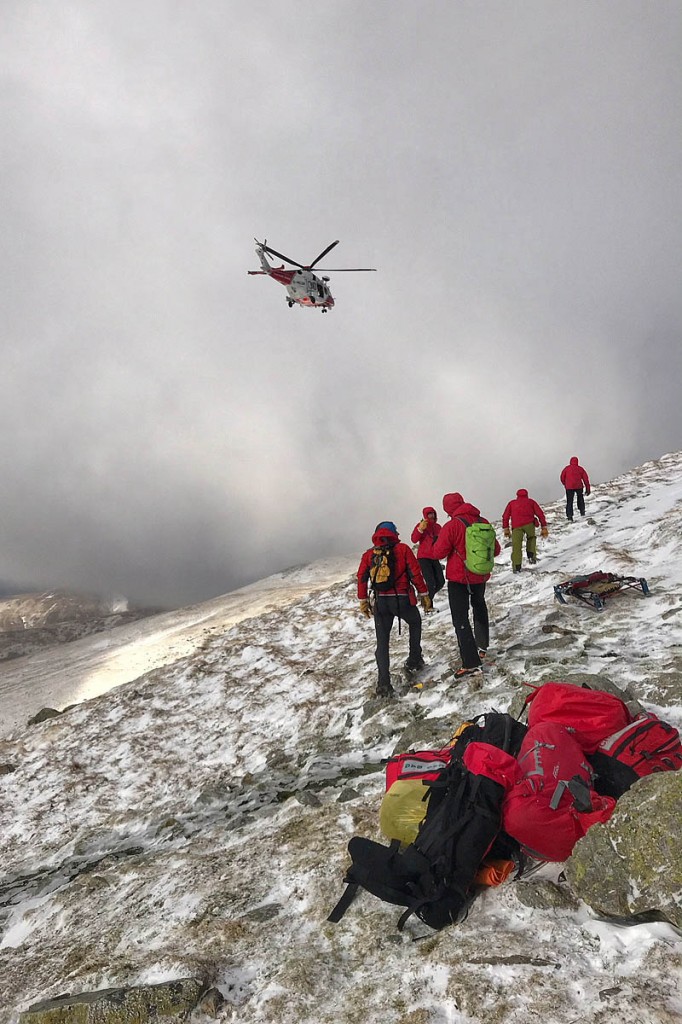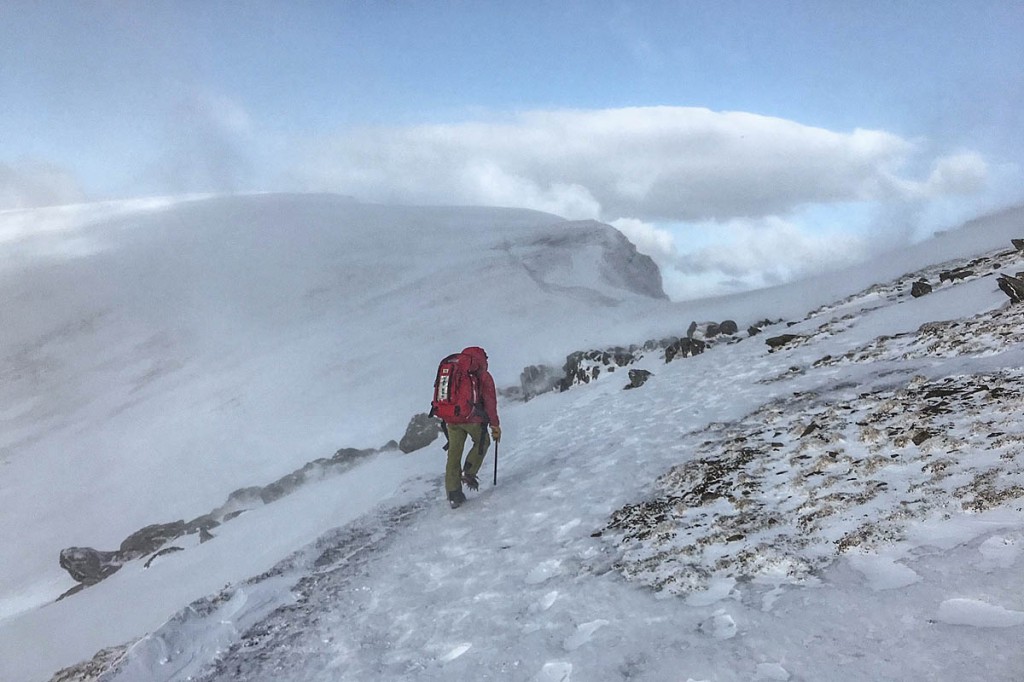
Rescuers and the Coastguard helicopter make their way to the scene of the fatal fall. Photo: Keswick MRT
A man has died after falling more than 200ft on England’s third-highest mountain.
Rescuers were quickly at the scene on Helvellyn yesterday but were unable to save the man, who hit rocks during his fall from the path from the summit to Swirls, near Browncove Crags.
Keswick Mountain Rescue Team and colleagues from the Patterdale team were already on the mountain range after being called out on Saturday afternoon to aid a woman reported to be stuck on steep ground in Nethermost Cove.
Rescuers were alerted about 3.35pm to the incident where the man had fallen. A Keswick MRT spokesperson said: “This was in the same place as two recent incidents, on the main footpath from Swirls car park to Helvellyn summit in the area beside Browncove Crags.
“The team immediately requested a winching helicopter in view of the likely seriousness of his injuries, and the team members who were descending from the top of Nethermost were quickly on scene, along with three Patterdale team members. Other team members were sent out from base to assist.
“A passing doctor also managed to get to the casualty quickly but, regrettably, the injuries the man had sustained were so serious that he didn’t survive.”
The Prestwick Coastguard helicopter flew to the site but was unable to winch the man from the mountain because of very strong winds.
The spokesperson said: “The team then stretchered the casualty down to Swirls car park to liaise with the police. Other team members escorted the casualty’s partner down.
“Conditions in the valley give no clue to how difficult conditions will be at 800m.
“The team cannot emphasise enough the serious challenge that the mountain poses in these winter conditions. Snow patches have frozen to bullet-hard ice, making crampons, and an ice-axe to arrest any slip or fall absolutely essential.”
Twenty-two Keswick MRT volunteers and three from the Patterdale team were involved in the incident for more than three hours.

A rescuer above Nethermost Cove during the search for the woman earlier in the afternoon. Photo: Keswick MRT
In the previous callout, no sign of the woman reported to be in difficulties at Swallow Scarth in Nethermost Cove could be found.
Both rescue teams searched for two hours in conditions described as cold, savagely windy and slippery underfoot, with visibility hampered by snow flurries.
The Keswick MRT spokesperson said: “It was concluded that she must have self-rescued.”
Diddy
19 March 2018If you have self rescued clearly a need to contact SAR to call off the search.
Ian
19 March 2018Ms Bradbury's recent TV programme must bear some responsibility for incidents such as this on Helvellyn. Naming it as the nation's favourite walk was bound to increase the number of folk climbing Helvellyn but as far as I can remember, there was no mention of the risks involved, particularly in winter conditions.
Graham Porter
19 March 2018Agree totally with previous comments, Helvellyn is not just a walk its a challenging ascent in any weather conditions
We are experienced walkers / ultra runners and even we keep away from the tops in these conditions. Same goes for all the high peaks leave them to artic weather experienced personal who are geared up for the adverse weather.
Jake Brewer
19 March 2018I don't agree with Ian's comment. Sure, it can be a dangerous place but everyone is responsible for making their own decisions, assessing the limits of their abilities and the risks involved in order to attempt a hike, walk, run or climb.
Just because someone touts it as a "favourite walk" doesn't mean they're at fault.
Very tragic and sad but accidents will always happen, even to the most prepared.
Maurice Heslop
19 March 2018The person who called out the rescuers to a woman on Nethermost did not see fit to alert them when they were not needed therefore putting them at risk. Totally irresponsible and shameful !!
wigan
19 March 2018r.i.p Andy
jono
19 March 2018People going onto these peaks should be adequately equipped and have a level of experience and training that compliments the areas they intend to climb in.
Having assessed the climb and the risks involved it is entirely their decision to take on the challenge.
I applaud the mountain rescue teams and their commitment.
I hope the situation never arrives when we have "mountain police" that advise walkers against taking to the hills, but there comes a point when some people who are inadequately kitted out and inexperienced are putting others at risk with foolhardy actions. The consequences of their actions can be life-changing not only for themselves but the other climbers who come to their aid
Carol
19 March 2018Firstly, those who called out MRT for the woman in difficulties may have been nothing to do with her and just seen her struggling. She also may not have known they'd been called. So, in those circumstances, there would be no-one to call off the search.
I have to say I agree with Ian with his comment about Julia Bradbury - these programmes do make mountains look much easier than they often are and make no mention of how serious they would be in winter, thereby encouraging those who aren't equipped to go up in bad conditions.
Ian (different Ian)
20 March 2018Well Maurice, typical armchair comment.
Bearing in mind there must have been a 2 hour gap between her first being discovered and the rescue team getting to the approx scene, she could have been in a really bad way. Bearing in mind she was 75 metres down a slope that was covered in ice and unable to retrace her steps it seems absolutely the correct thing to do. What do you suggest leave people up there to chance?
Well done to the services for a great effort although obviously sad regarding the fatality.
Michael West
20 March 2018Never had to call you out myself but it is so good to know you are there, thank you so much for the brave work you all do, thank you, thank you, thank you, keep safe xxxxx
Ian
20 March 2018In response to Jake Brewer.
Yes, accidents will always happen, even to the most experienced - it's a sad fact.
And yes, everyone should be responsible for their own decisions and assessing the risks involved before setting out. But this includes taking note of the advice from MRTs to go adequately equipped and trained for winter conditions. I can well understand the frustration of our MRTs which provide such a self-less and professional service when they have to attend so many avoidable incidents.
I was not saying that this individual was influenced by a TV programme but you can bet that many have been and may be unwittingly putting themselves and others at risk through blind ignorance.
steve s
21 March 2018I was on Helvellyn on Saturday climbing one of the gully's and the conditions on the top where bad, with very strong winds gusting to make walking at times near impossible. Please will anyone going up this time of year make shore that they have the correct equipment and clothing ( ice axe and crampons) the tops are so much different than the valley's this time of year.
Thanks to all the MRT TEAMS for all there work
Margaret
21 March 2018Remember - add to the comment 'have ice axe, crampons' with 'and know how to use them'.
Anon
23 March 2018Was on Helvellyn on Saturday and assisted the 'woman in difficulties' off the hill. She recognised that she'd misjudged conditions, put herself in a precarious position and had wisely decided to seek assistance. She has prior mountain experience (definitely not inspired by the TV!) and carried whistle, emergency food, spare clothing etc.; unfortunately not crampons & ice axe.
We weren't aware that MRT had been called. We spoke to MRT during our descent but suspect our account didn't tally with their information (I expect they would have searched anyway to confirm that there weren't multiple incidents). We've subsequently provided further information to them. It was only by chance that they weren't needed on this occasion.
Third party who called MRT made a good decision to call and (IMO) was justified in leaving the scene as the ridge wasn't a place to be waiting given the conditions.
John N
27 March 2018There appears to be an assumption that anyone who takes a fall is probably inadequately equipped. Completely wrong. Even with all of the correct equipment, people can and do take a tumble. I don't know if the man who tragically died had the necessary equipment but it's totally insensitive to make that assumption without the facts, particularly at such a sad time for his family and friends.
And to blame Julia Bradbury's TV programme on these type of incidents is way off the mark. I agree with Jake and Jono, everyone has to take responsibility for their own actions and not blame it on anyone else. With arguments like Ian's then we'd have to ban the transmission of all climbing and walking programmes. Oh, and let's not forget the many publications too!
Ian
21 April 2018In reply to John N.
The point I was trying to make John was that programmes such as Ms Bradbury's often give the impression that our mountains are accessible to everyone, all year round and this can result in inexperienced folk getting into difficulties. I am not suggesting such programmes should be banned but pick up any outdoors magazine or guide book and you will see warnings about the risks of hillwalking and mountaineering. In my opinion, TV programmes which encourage folk to venture into the mountains (particularly in winter) should include similar advice which could be put over in a gentle way by the presenter.
For the avoidance of doubt, I did not say that the unfortunate individual in this case was inexperienced or ill-equipped and my thoughts are with his family for their sad loss.
Julie Britton
21 June 2020Disagree with all the comments blaming the Julia Bradbury programme about Striding Edge. She did say it was a difficult walk before she did it...with her experienced partner guide. Also, if she’d have said that it is a highly dangerous route, even more people would attempt it as people do get an adrenaline rush from knowing they are doing something very risky. People will do what they want to do at the end of the day, and will not be encouraged nor discouraged after watching a TV programme if they would prefer to do a more challenging route to the summit.